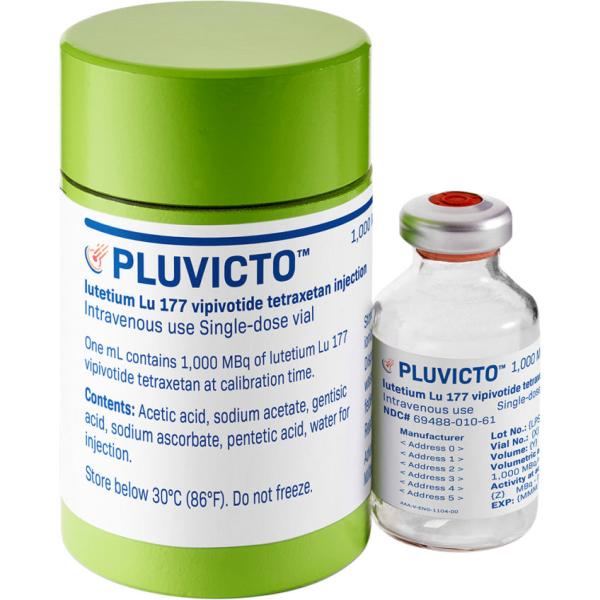Pluvicto Disease Interactions
There are 2 disease interactions with Pluvicto (lutetium lu 177 vipivotide tetraxetan).
Lutetium Lu 177 vipivotide tetraxetan (applies to Pluvicto) myelosuppression
Moderate Potential Hazard, Moderate plausibility. Applicable conditions: Bone Marrow Depression/Low Blood Counts, Immunodeficiency
Lutetium Lu 177 vipivotide tetraxetan can cause severe and life-threatening myelosuppression (including anemia, thrombocytopenia, leukopenia, neutropenia); caution is recommended in at-risk patients. Complete blood counts should be performed before and during therapy.
References
- (2022) "Product Information. Pluvicto (lutetium Lu 177 vipivotide tetraxetan)." Advanced Accelerator Applications
Lutetium Lu 177 vipivotide tetraxetan (applies to Pluvicto) renal impairment
Moderate Potential Hazard, Moderate plausibility. Applicable conditions: Renal Dysfunction
Exposure of lutetium Lu 177 vipivotide tetraxetan is expected to increase with the degree of renal dysfunction. No dose adjustment is recommended for patients with mild (baseline CrCl 60 to 89 mL/min by Cockcroft-Gault) to moderate (CrCl 30 to 59 mL/min) renal dysfunction; as these patients may be at greater risk of toxicity, renal function and adverse reactions should be monitored frequently. Pharmacokinetics and safety of lutetium Lu 177 vipivotide tetraxetan have not been studied in patients with severe (CrCl 15 to 29 mL/min) renal dysfunction or end-stage renal disease; caution is advised in these patients.
References
- (2022) "Product Information. Pluvicto (lutetium Lu 177 vipivotide tetraxetan)." Advanced Accelerator Applications
Pluvicto drug interactions
There are 206 drug interactions with Pluvicto (lutetium lu 177 vipivotide tetraxetan).
More about Pluvicto (lutetium lu 177 vipivotide tetraxetan)
- Pluvicto consumer information
- Check interactions
- Compare alternatives
- Pricing & coupons
- Reviews (2)
- Drug images
- Side effects
- Dosage information
- During pregnancy
- FDA approval history
- Drug class: therapeutic radiopharmaceuticals
Related treatment guides
Drug Interaction Classification
| Highly clinically significant. Avoid combinations; the risk of the interaction outweighs the benefit. | |
| Moderately clinically significant. Usually avoid combinations; use it only under special circumstances. | |
| Minimally clinically significant. Minimize risk; assess risk and consider an alternative drug, take steps to circumvent the interaction risk and/or institute a monitoring plan. | |
| No interaction information available. |
Further information
Always consult your healthcare provider to ensure the information displayed on this page applies to your personal circumstances.


